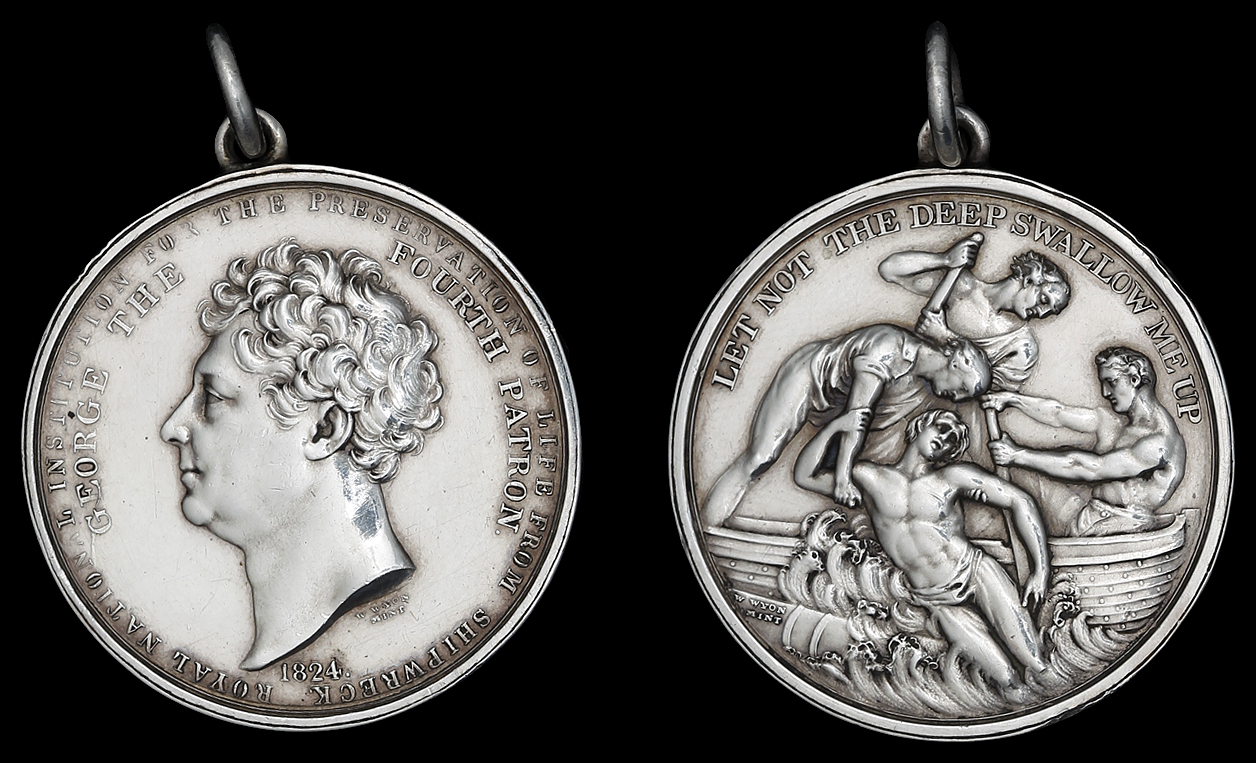
Auction: 11010 - Orders, Decorations, Campaign Medals & Militaria
Lot: 290
Royal National Institution for the Preservation of Life From Shipwreck Medal, silver, type 1 1824-62, obverse: head of King George IV facing left (Owen Williams, Voted 14 Jany. 1835.), engraved in upright serif capitals, good very fine, with integral band, eyelet suspension, and riband ring Estimate £ 550-650 Owen Lloyd Williams, Coxswain, Cemlyn Lifeboat No. 1, citation reads: ´31st October 1834: In squalls and a strong tide, the steam packet Leeds, on passage from Liverpool to Dublin, struck Harry Furlong´s Rock, off Cemlyn, Anglesey, and, with the tide continuing to flow, was forced off to seaward with the loss of her rudder. She was making water fast and signalled to the steamer Commerce which was nearby. With the assistance of boats from both steamers, some 40 of the 60 passengers were got on board the Commerce. Coming on to blow with squalls and a strong tide running, a boat from the Leeds with three men on board was unable to reach either vessel or to return to shore. The No. 1 lifeboat stationed at Cemlyn was launched and with close reefed sails reached the Leeds boat through a dangerous cross sea and rescued the three men and landed them at Cemlyn. The stricken Leeds was taken in tow by the Commerce and towed to Holyhead where they arrived after nine hours. The Leeds sank five minutes after the last passengers had been taken off.´ The wooded paddle steamer Leeds was built by John Wilson at Liverpool in 1826 for the City of Dublin Steam Packet Company´s busy Dublin to Liverpool service. A combined passenger and cargo steamer registered at 243 tons, she measured 141 feet in length with a 25 foot beam. Occasionally sailing on the company´s Dublin to Belfast route, she also ran on the Bristol to Dublin service during a brief charter from January to March 1828. For this action Owen Lloyd Williams, the Coxswain, was awarded the R.N.L.I. silver medal and a gratuity of £5 from the City of Dublin Steam Packet Company; the five crew members were also given gratuities of £5. The Rev. Owen Lloyd Williams was the son of the Rev. James Williams, the Rector of Llanfair-yng-Nghornwy, Anglesey, Secretary of the Anglesey Association for the preservation of Life from Shipwreck, and the inventor of the self-inflating life-buoy, who in 1828 had established the first lifeboat station on the Isle of Anglesey. James Williams was the first man in north Wales to be awarded the R.N.L.I. gold medal, for his part in rescuing the crews of the Belfast smack Active and the Liverpool ship Sarah. Owen Lloyd Williams succeeded his father as Coxswain of the Cemlyn lifeboat in 1835 and held the command until he retired in 1876. He received the R.N.L.I. Silver medal on two further occasions: Second Service: The Rev. Owen Lloyd Williams, Hon. Secretary, Abersoch R.N.L.I., citation reads: ´14th-15th January 1870: The Liverpool ship Kenilworth, homeward bound from New Orleans with a cargo of cotton, was caught in a severe squall during a north-west gale and grounded on St. Patrick´s Causeway, Cardigan Bay, north-west of Barmouth, Merioneth. Eight men were saved by the Barmouth lifeboat before it was forced to leave by rising seas and by the gale that had increased to hurricane force. The Abersoch self-righting lifeboat Mabel Louisa had launched from her station on the Lleyn Peninsula, Caernarvon, but was unable to find the casualty. Shortly after her return to Honorary Secretary arrived and with him on board, the lifeboat relaunched. After a three hour search in dreadful seas, they found the wreck and, going alongside, took off the 13 survivors in hazardous circumstances. The Rev. Owen Lloyd Williams has been instrumental in saving 52 lives from various wrecks.´ Third Service: The Rev. Owen Lloyd Williams, Hon. Secretary, Abersoch R.N.L.I., citation reads: ´10th October 1878: The Reverend Williams came of a family devoted in every way to lifeboat service and took an active part in their activities. Not for him the Honorary Secretary staying ashore directing operations- he preferred to be in the thick of things and this award was made in recognition of his long co-operation and intrepid services. A gale was blowing when the Liverpool barque Dusty Miller, St. John´s to Holyhead with a cargo of timber, was seen in distress riding at anchor near St. Patrick´s causeway in Cardigan Bay, off Barmouth, Merioneth. The Barmouth lifeboat could not launch in the gale, so the Abersoch lifeboat Mable Louisa put off and, arriving at he scene, was asked to stay alongside until the weather moderated. Despite the gale and heavy sea, the lifeboat, with the Reverend Williams on board, remained on station until a steam tug arrived at 6:00am and took the barque into St. Tudwall´s Roads off Abersoch.´ Provenance: J.B. Hayward Collection, Spink, November 1995.
Sold for
£850




